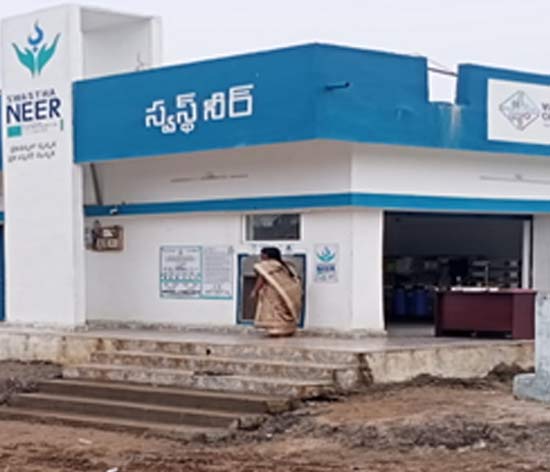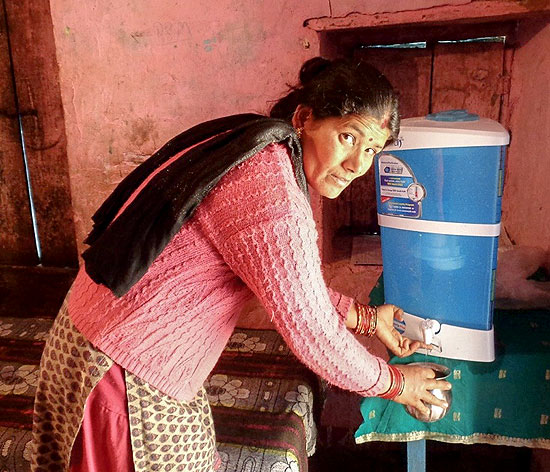WaSH
Water Access
About the theme
Water supports not just the needs of humans, but also that of crops and animals. However, the availability of water in a region by itself does not make it viable for consumption unless it is treated and made safe for drinking. Its access and usage depend upon several factors such as the installation of water purification systems, the presence of water taps in households and functional water pumps. To conserve water and prevent it from contamination, communities need to be aware of safe and desired WASH habits, including the use of toilets.
In order to address the challenges of water scarcity and water contamination, and to contain the risks related to improper sanitation, the Tata Trusts have collaborated with partners to implement the following initiatives under their Integrated Drinking Water and Sanitation Programme, while deploying innovative and affordable technology.
Latest
View more themes
...Continued
Water Security
Reviving springs, augmenting rainwater discharge, and constructing recharge ponds and pits through springshed management and participation of communities.
...Continued
Sanitation and Hygiene
Bringing about improved WASH practices through SBCC.
View all initiatives under this theme
...Continued
Integrated Drinking Water Project in multiple states in partnership with the Jal Jeevan Mission
The Tata Trusts’ Integrated Drinking Water Project (IDWP) aims to provide functional tap connections to households, thus ensuring the year-round availability of safe water for rural community.
...Continued
Tribal area development project, Gujarat
Aiming to improve the quality of life in tribal communities across several states.
...Continued
WaSH projects in tribal areas of south Rajasthan
Changing behaviour amongst tribal communities with regard to storage and treatment of water, open defecation, personal and menstrual hygiene.
...Continued
Technology innovation
Deploying innovative and affordable technology, including artificial intelligence, for setting-up water purification systems and augmenting water resources.
...Continued
Coastal area development project, Gujarat
Close to 18 per cent of India’s population lives along its coastline in 72 coastal districts and is impacted by rising salinity as seawater moves into ground water sources. Also known as the Kharash Vistarotthan Yojana – KVY, the coastal area development project undertaken by the Tata Trusts in Gujarat covers a total of 250 villages along the state’s 1,600km coastline.
The integrated programme also includes interventions that centre around agriculture and horticulture, financial services, developing markets and value addition, dairy development and animal husbandry, support irrigation and water saving technologies, drinking water and sanitation, nutrition, elementary education, skill development and community institutions.
Under phase II of the Coastal Area Development Programme, the Tata Trusts aim to deepen the reach of their water and sanitation programmes. A total of 270 new villages have been identified across the six districts of Junagadh, Jamnagar, Porbandar, Bhavnagar, Amreli and Kutch. This programme will be jointly funded by the Government of Gujarat, Conrad N Hilton Foundation, Bill & Melinda Gates Foundation and TWM.
...Continued
WaSH project in Yadgir, Karnataka
Through its associate organisation Kalike Samruddhi Upakram (KSU), the Tata Trusts have implemented several programmes around agriculture, rural livelihoods, financial services, drinking water and sanitation, nutrition, elementary education, skill development and community institutions.
The Tata Trusts are active in several interventions in Yadgir, Karnataka, which has been identified as a backward region on several socio-economic parameters. Through its associate organisation Kalike Samruddhi Upakram (KSU), the Tata Trusts have implemented several programmes including those that centre around agriculture and horticulture, financial services, support irrigation and water saving technologies, drinking water and sanitation, nutrition, elementary education, skill development, and community institutions. A total of 75 villages have been identified in Karnataka under TWM.
...Continued
WaSH project in tribal areas of Jharkhand
A set of initiatives directed towards enhancing water supply, addressing microbial contamination and improving access to safe drinking water in the state.
In certain parts of Jharkhand, almost 98 per cent of households are exposed to untreated water, and close to 32 per cent households do not have a water source close to their home.
With support from Tata group companies, the Tata Trusts have rolled out several water related initiatives for safe drinking water solutions in rural communities in Jharkhand. The Amrutdhara programme covers 27 villages in the Purbi Singhbhum district. Under the Tata Water Mission, the Trusts have undertaken rainwater harvesting, pond deepening and other initiatives for enhancing water supply, and have provided hand pumps for improving access to water in almost 200 villages. The Trusts’ nodal agency – Collectives for Integrated Livelihood Initiatives (CInI) – also conducts integrated drinking water and sanitation programmes in Jharkhand.
Another WASH initiative targets 100 villages identified across the four districts of Dumka, Khunti, Koderma and Deoghar. This effort will be co-financed by Bill and Melinda Gates Foundation and the implementation partners are Pradan in Dumka, Khunti and Koderma, and NEEDS for Deoghar. Going forward, over 200 villages in Jharkhand will benefit from initiatives covering all aspects of TWM. The Trusts are also looking at collaborations for introducing a technology-based household-level water purification system for addressing microbial contamination in water.
...Continued
WaSH projects in north-eastern states
Under the Tata Water Mission, the Trusts have extended their WASH initiatives across the country, including the north eastern states of Nagaland, Mizoram and Arunachal Pradesh.
In India’s north eastern states, over 30 per cent of households do not have a water source near their home. Through their North East Initiative Development Agency (NEIDA), the Tata Trusts have rolled out initiatives in Nagaland, Arunachal and Mizoram directed towards agriculture and horticulture, financial services, developing markets and value addition, dairy development and animal husbandry, support irrigation and water saving technologies, drinking water and sanitation, elementary education, skill development and community institutions.
A total of 45 villages have been identified as a focus area for the Tata Water Mission. Through NEIDA, the Trusts have initiated a drinking water and sanitation pilot project in Nagaland and garnered institutional support for implementing the Swachh Bharat Mission (Gramin) in Mizoram and Nagaland. The Trusts are also looking at collaborations for introducing a technology-based household-level water purification system for addressing microbial contamination in water.
...Continued
WaSH programme in schools
This is a programme run under the Himmotthan initiative of the Tata Trusts and in partnership with HPCL Foundation to improve water and sanitation facilities in 50 schools.
Through its initiative Himmotthan Pariyojana, the Tata Trusts are implementing WASH programmes in 50 government schools covering more than 3,000 students in Uttarakhand, Jharkhand, Gujarat and Karnataka. This is with the funding support from Hindustan Petroleum Corporation Limited (HPCL). The project helps establish potable water and sanitation facilities, and strengthens school management committees and school clubs through the use of Behaviour Change Communication (BCC) and Information, Education, and Communication (IEC) tools.
...Continued
Tata-Swades Integrated Livelihood Enhancement Project in Raigad district, Maharashtra
An initiative to improve water and sanitation problems in rural Maharashtra covering 1 million people and involving the building of toilets and installing water taps in all households.
In partnership with the Swades Foundation, the Tata Trusts have embarked on an initiative to improve water and sanitation problems in rural Maharashtra. The goal is to benefit 1 million people over 6-7 years, and build one toilet and two water taps in all households. The supply of water will be arranged from rainwater harvesting and spring wells.



